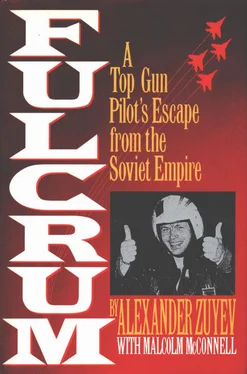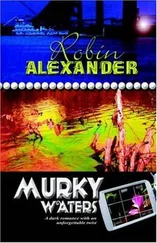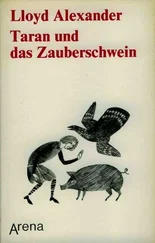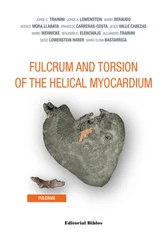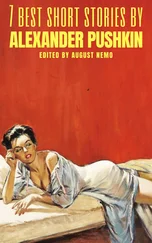Once more, I circled the area like a stalking cat. Then I entered through the dining room door. With my back turned to the operations desk at the end of the corridor, I hefted the armory padlock and thrust the thin metal file into the key slot. I broke off the file and jiggled the lock, making sure the slot was securely jammed.
Outside, a mist was rising in the still, damp night. The lopsided quarter-moon was low in the western sky. I took the keys from the duty section van and the fuel truck and dropped them through the grate of a storm sewer. The vehicles could no longer be used to block the runway.
Unfortunately the phone lines from the control tower were exposed to view. Twice I approached the end of the tower where the wires looped away from the junction box just above head height. Twice I stopped when I saw someone moving up in the greenhouse.
I paced in the shadows of the nearby maintenance hangar, wiping my sweaty hands on the legs of my flight suit. I could see my plan unraveling. I fought back panic and the urge to bolt, to just scramble under the barbed-wire fence, toss away the incriminating wire cutters, snatch my escape kit from the weeds, and keep running south.
At exactly 0506 I managed to cut the six phone lines from the control tower junction box. I strode away quickly to wait behind the maintenance hangar. If cutting those phone lines had triggered an alarm, the guard van from regimental headquarters would arrive soon. Ten minutes passed. The tower and alert building were silent.
Off to the east, the serrated ridges of the Caucasus steadily gained definition in the first peach glow of dawn. I was still on schedule. But there was no telling how long the neozepam would work.
A terrible sequence of events rolled through my mind like the lantern slides of an illustrated tactical lecture. The division duty clerk tries to phone Natasha in the tower. Dead line. He tries the emergency line. No answer. He sends a runner to the guard captain. They return to check the phone lines and find the cut ends. They then decide to arm the guard section, but discover the jammed lock. An alarm is sounded and the drugged officers stumble awake. Where is Zuyev? Where the hell is he?
But this was only panic. The base was quiet. I marched directly to the side door of the dining room and entered silently. Crouching in the dark corner, I felt each wire with my thumb and finger, then cut it. As I snapped down the cutter blades on the last wire, the thin strand slipped. It took me four stabs to cut it. Then I heard a loud single ding of the telephone bell in the dormitory. Again sweat beaded on my face. Cutting that last line had broken the circuit, triggering the bell’s magnet. This was fourth-form physics. Why hadn’t I thought of it?
I have to hurry now, I thought, grabbing my helmet bag of papers.
But outside I forced myself to stop and slip into the hedge beside the dormitory window. Just as I had feared, I saw Petrukhin on his feet inside. In the faint light I watched him lift the telephone, then bang down the receiver. Now he was in the doorway to the hall. I didn’t want to watch.
As I approached the alert apron, I pulled the Makarov pistol from the left breast pocket of my leather flight jacket, cocked the action but did not set the safety as I normally did. Ahead, the familiar outline of a soldier wearing a black quilted jacket and a floppy southern field hat, an AKM slung on his shoulder, was silhouetted against the flank of the first aircraft. I recognized Corporal Chomayev now, a stocky, broad-shouldered Asian, one of the better soldiers in the guard detachment. He had always been quiet and stoic, but, unlike others, quick to follow orders. Too bad. I did not want to have to hurt Chomayev and hoped I could disarm him quickly. I certainly did not want to fight this tough youngster.
It was dawn. Time to act.
CHAPTER 14
Vengeance
May 20, 1989
I reached across with my left hand to hit the button for the number two engine auto start. Nothing. Just the dry clicking of the igniter.
My eye shot forward to the voltmeter. The battery was at full charge, twenty-four volts. I hit the starter again. Nothing. I turned and craned my neck out of the cockpit, but saw no one near the apron or alert building. Off to the left, I noticed Corporal Chomayev’s wide-brimmed field hat lying on the oil-stained concrete apron amid a pile of spent brass shell casings from his AKM. He was either wounded or dead, hidden from sight. Luckily the apron guards had only been issued a single thirty-round magazine. But maybe he wasn’t badly wounded, after all. Maybe he was already back at the alert building spreading the alarm. Maybe Natasha was already speaking to Division on the control tower emergency radio channel.
Then my eye caught something blue lying on the apron near Chomayev’s hat. My helmet bag full of papers. I had dropped it in the fight. But I could certainly not climb down to retrieve it. If I did not start my engines immediately, I would have to try to escape on the ground.
I engaged the starter a third time. Nothing. Just that bone-dry click.
I knew I was dead. The Osobists must have installed a secret new electronic lock on the starting system of the alert planes, just as they had padlocked the throttles of the other fighters after the spy scare last year.
I sagged in the ejection seat. Closing my eyes again, I filled my lungs deeply with the cool morning air. In a minute, two at the most, this fighter would be surrounded by soldiers. Even without their rifles, they could disarm me and drag me to the ground. It would be easy just to sit here with my eyes closed, breathing slowly, waiting for the end. But my years of training would not permit surrender. I remembered the words Lieutenant Tveretin had taught me so many years before on that sun-blasted runway in Azerbaijan. “When a system fails, Zuyev, there’s always a reason. A good pilot does not panic.”
I opened my eyes and scanned the instrument panel one last time. The battery was fully charged, twenty-four volts. The engine circuit breakers on the PTO electrical panel at my right elbow were set correctly. The throttles were…
The throttles. My left hand went instinctively to the two throttle knobs. They were spring-locked in the full stop position at the end of the twin rails. The heel of my hand hit the knobs and I released the stop springs with a quick snap. Like a first-year cadet sweating in the front seat of an L-29, I had made the most obvious mistake imaginable. I had tried to start my engines with the throttles at stop. Now I advanced both throttles to idle and hit the auto start button again. The big number two R-33 turbofan roared to life, shaking the cockpit with the familiar rumble. Amber lights winked out on the caution warning panel. The engine’s fuel-flow gauge and tachometer needle sprang alive.
I had no time to waste with a takeoff checklist. Even if Chomayev had not yet reached the alert building, the noise of this engine certainly had reached the control tower. The number one engine would start automatically in a few moments, once number two reached twenty-eight percent RPM. I flipped on the remaining switches on the PTO panel and grabbed the stick clumsily with my right hand to trip the ducktail brake release lever.
With my left hand I slid the number two throttle forward to ninety percent, then chopped it back to idle. The plane did not move. I glanced down to make sure my fingers — which were almost numb from the shoulder wound — were properly squeezing the brake release lever. That was not the problem. I leaned out the open cockpit and saw the thick umbilical cable from the starting generator cart anchoring the plane to the apron.
Again I slid the throttle forward, to ninety-three percent, before chopping it back. The engine roared. Still, the airplane did not move. I took the risk of going to full military power. If the cable suddenly popped before I had cut power and braked, the plane could lunge uncontrollably forward and the nosewheel bog down in the “swamp,” the soggy grass margin beside the taxi ramp. But I had to accept this hazard.
Читать дальше
